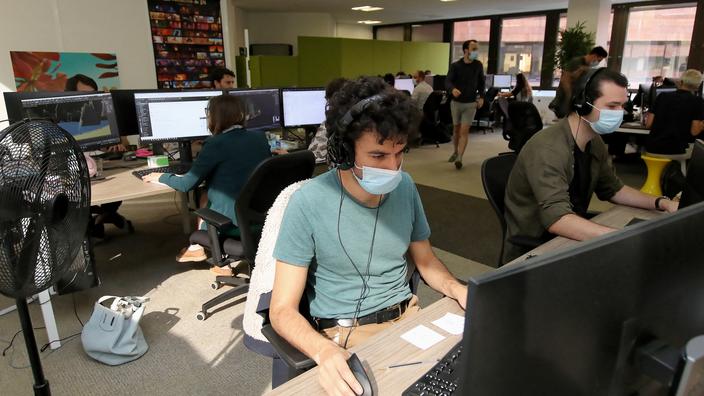The Covid-19 was the first cause of work stoppages of employees (outside the public service) from January to May, mainly due to the derogatory stops related to the coronavirus, according to a survey by Malakoff Humanis published on Thursday.
Overall, the number of employees who had at least one sick leave increased by three points (+ 30%) over the period studied, “
going from 10% of employees in January to 13% in May
”, specifies Malakoff Humanis in a report. communicated.
Read alsoBurn-out: when work is exhausting
In total, 46% of work stoppages were due to Covid-19 from January to May, including 12% of cases of infection diagnosed and 34% of exceptional stoppages caused by the epidemic. "
The peak was reached in April 2021
", with 52% of work stoppages linked to Covid (including 15% of cases diagnosed), according to the study.
After the coronavirus, the “
main reasons for sick leave
” were accidents or trauma (21%), ahead of psychological disorders (depression, anxiety, stress) and professional exhaustion or burn-out, which together represent “
19% of stops
”, details Malakoff Humanis.
Serious illnesses led to 12% of the stoppages, as did musculoskeletal disorders.
The share of work stoppages among managers (17%) is "
higher than among non-managers
" (11%), notes the social protection group.
“A deterioration in the mental health” of employees
"
The renunciation of sick leaves decreases
" over the period studied: "
8% of employees continued to work although their doctor prescribed them a work stoppage
", while "
they were 19% in September 2020
", underlines Malakoff Humanis, which has been measuring since March 2020 the impact of the health crisis on the health of employees.
From January to May, apart from the coronavirus, 16% of shutdowns were “
long (more than one month)
”, compared to the 12% of long shutdowns recorded in 2020 and 9% in 2019.
Read also To avoid working, he calls his own number for 55 hours
According to a second survey, the health crisis has led to "
a deterioration in the mental health
" of employees, who suffer from "
a general weakening of (their) psychological state
". Four in ten employees (41%) believe that the health crisis has had a “
negative impact
” on their mental health and “
nearly one in ten employees (9%) consider themselves to be in poor mental health
”.
If 82% of employees are "
satisfied with their work
", 35% are "
stressed
" and "
24% say they are at the end of their rope
", while 30% fear losing their job, notes Malakoff Humanis. These studies were carried out on representative samples of employees, excluding the public service (10,028 people questioned each month from February to June for the first, 1,510 from April 28 to May 10 for the second).









